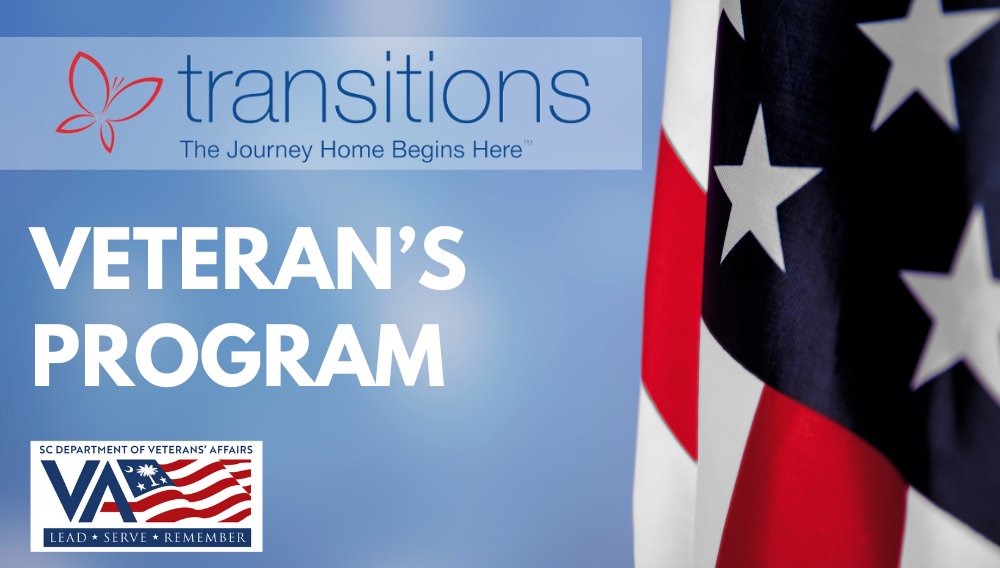A look at the VA-Transitions partnership working to ensure no homeless veteran is left behind.
By Craig Currey

The Department of Veteran Affairs (VA) has made significant strides to reduce and end veteran homelessness in the Midlands of South Carolina and across the country.
Partnering with community agencies helps to expand on that success and bring more resources to the table. The Columbia VA Medical Center partners with many nonprofit agencies, and this commentary will focus on its partnership with Transitions Homeless Center — the largest homeless facility in the Midlands.
The VA’s Health Care for Homeless Veterans Program has several components that house homeless veterans permanently.
One grant program involves the VA contracting with community agencies to provide immediate shelter and case management services to help veterans achieve residential stability, increase their skill or income levels, and obtain greater self-determination.
The Columbia VA partnered with Transitions over the past four years and recently was awarded an increase in the number of beds dedicated to helping veterans.
As of October 2023, Transitions has a total of 20 beds (four of them for female veterans) through the Grant and Per Diem Program. This type of partnership allows the VA to have a network of beds across the Midlands where veterans can be placed immediately.

A bed for a homeless veteran at Transitions Homeless Center in Columbia. (Provided by Transitions)
Those beds are classified as “low demand” beds, which means they’re set aside for veterans who have not done well in other homeless programs and have many barriers to housing. The case managers at Transitions work with these veterans to link them with needed services, both at the VA and in the community, to overcome those barriers so that they can move to permanent housing that fits their needs.
Additionally, Transitions was awarded a contract for 28 shorter-term emergency residential beds for men through the Columbia VA in July 2023, due to an increased demand for transitional housing beds.
These beds provide a three-month option for veterans in need of immediate shelter who have failed at other shelter options. All veterans receive case management services from both Transitions staff and the VA to help them overcome their barriers to housing and to link them with needed mental health and substance treatment programs.
Over the past year, Transitions has permanently housed 41 veterans who came in homeless through the two programs.
Transitions also provides case management services to veterans who successfully exit to permanent housing, giving them that extra support needed to navigate the stresses of living on their own again. For many, it is the first time in a very long period.
This VA-Transitions partnership assures that newly housed veterans have the support they need to reside on their own and can maintain their housing. The Transitions case managers visit the veterans both on and off-site, to help with job placement, as well as locating and moving into suitable housing. They also host a monthly brunch to build a sense of community. Transitions calls this after-care program Supporting and Advancing Veterans Empowerment, or SAVE.
Historically, about 10% of Transitions’ shelter population are veterans. In partnering with the VA, these veterans receive the help they deserve quickly.
As a result, the veteran gets the best of both worlds — the VA Health Care system with all the programs that it has to offer and the Transitions’ programs. Services include employment assistance, peer networking, application assistance, and linkage with community health and mental health treatment programs. These Transitions programs are available to all clients, not just veterans.
So how does this look in reality?
“Susan” served honorably in the Army for four years. She ended up homeless seven times over the last three years, which gave her the label of “chronically homeless.” She was also a victim of domestic violence and was living on the streets when she came to Transitions.
She received addiction and mental health counseling to help deal with and manage the trauma that she endured, which helped her to learn how to cope better and enabled her to find full time employment and permanent housing in November 2023. “Susan” overcame her circumstances and is a success story for the VA-Transitions partnership.
For a city like Columbia, which boasts that it is the “most military friendly city in America,” caring for its homeless veterans is a necessary part of our community. The nonprofits in the Midlands provide more resources for helping unhoused veterans and also ensures that no
unhoused veteran is left behind.

